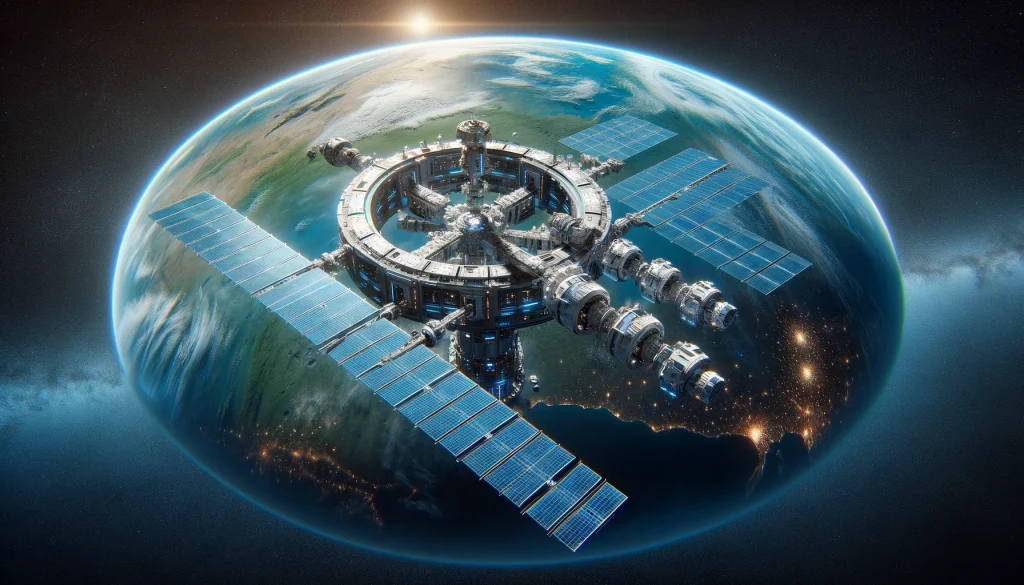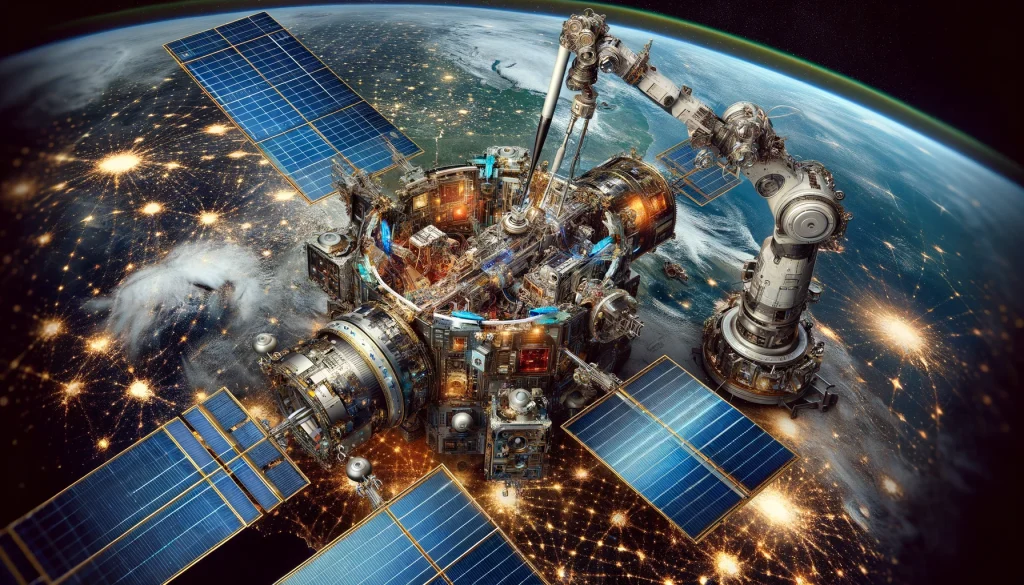In the vast expanse of the universe, humanity’s exploration of space stands as one of its most remarkable achievements. Over the decades, space exploration has progressed from initial forays into Earth’s orbit to ambitious missions targeting distant planets and celestial bodies. This article delves into the significant advancements in space exploration and the pivotal role of technology in extending humanity’s reach beyond Earth’s confines.
Table of Contents:
- I. Early Exploration: Pioneering the Final Frontier
- II. Expanding Horizons: Probing the Depths of Space
- III. Cutting-Edge Technologies: Enabling Bold Ventures
- IV. Beyond Earth: The Quest for Extraterrestrial Life
- V. Future Prospects: Towards Interstellar Travel
- VI. Ethical and Environmental Considerations
- Conclusion
- FAQs
We invite you to read: “THE ROLE OF TECHNOLOGY IN EDUCATION: ENHANCING LEARNING”

I. Early Exploration: Pioneering the Final Frontier
- The Space Race: The mid-20th century witnessed a fierce competition between the United States and the Soviet Union, known as the Space Race. Milestones such as the launch of Sputnik 1 in 1957 and Yuri Gagarin’s orbit of the Earth in 1961 marked significant achievements in space exploration.
- The Apollo Missions: One of the crowning achievements of human space exploration was the Apollo program. Neil Armstrong’s historic step onto the lunar surface in 1969 remains an iconic moment in history, symbolizing humanity’s ability to transcend earthly boundaries.
II. Expanding Horizons: Probing the Depths of Space
- Robotic Exploration: Advancements in robotics have enabled the deployment of unmanned spacecraft to explore distant reaches of the solar system and beyond. Missions such as Voyager, Cassini-Huygens, and the Mars rovers have provided invaluable insights into planetary bodies and their composition.
- International Collaboration: In recent years, space exploration has increasingly become a collaborative endeavor involving multiple nations and space agencies. Projects like the International Space Station (ISS) exemplify the spirit of cooperation in advancing scientific research and human presence in space.
III. Cutting-Edge Technologies: Enabling Bold Ventures
- Advancements in Propulsion: Breakthroughs in propulsion technologies hold the key to unlocking faster and more efficient means of space travel. Concepts such as ion propulsion and solar sails offer promising avenues for future interplanetary exploration.
- Precision Landing Systems: Landing spacecraft on distant planets poses formidable challenges, necessitating the development of advanced landing systems. Technologies like precision landing and autonomous navigation enhance the accuracy and safety of landing missions.
We invite you to read: “BIOTECHNOLOGY BREAKTHROUGHS: ADVANCEMENTS IN HEALTHCARE AND BEYOND”

IV. Beyond Earth: The Quest for Extraterrestrial Life
- Exploring Exoplanets: The discovery of exoplanets orbiting distant stars has fueled speculation about the existence of extraterrestrial life. Efforts to characterize these exoplanets and identify potentially habitable environments represent a crucial frontier in space exploration.
- Search for Biosignatures: Scientists are actively searching for signs of life beyond Earth by studying the atmospheres of exoplanets for biosignatures—indicators of biological activity. Advanced telescopes and spectroscopic techniques are instrumental in this quest.
V. Future Prospects: Towards Interstellar Travel
- Interstellar Exploration: While current space exploration efforts focus primarily on the solar system, the prospect of interstellar travel looms on the horizon. Concepts like the Breakthrough Starshot project envision sending nanocraft to neighboring star systems at relativistic speeds.
- Emerging Technologies: From warp drives to antimatter propulsion, scientists are exploring exotic technologies that could potentially revolutionize interstellar travel. While many of these concepts remain speculative, they represent the bold ingenuity driving humanity’s quest to explore the cosmos.
VI. Ethical and Environmental Considerations
- Planetary Protection: As humanity ventures further into space, concerns about contaminating other celestial bodies with Earthly microbes have prompted the development of planetary protection protocols. Safeguarding pristine environments is essential for preserving the integrity of scientific exploration.
- Space Debris Management: The proliferation of space debris poses a growing threat to space missions and satellite operations. Strategies for mitigating space debris, such as active debris removal and collision avoidance measures, are imperative for ensuring the sustainability of space activities.
We invite you to read: “THE EVOLUTION OF MOBILE TECHNOLOGY: FROM 1G TO 5G”

Conclusion
As humanity stands at the threshold of a new era of space exploration, the possibilities are as vast as the cosmos itself. Advancements in technology continue to propel us towards ever greater feats of discovery and exploration, from probing the mysteries of distant planets to contemplating the existence of life beyond Earth. With each new milestone, we inch closer to realizing the dream of becoming an interstellar species, bound not by the limits of our planet, but by the boundless expanse of the universe.
Through international collaboration, innovation, and a steadfast commitment to scientific inquiry, we can navigate the challenges that lie ahead and forge a path towards a future where the final frontier is within our grasp.
In the words of Carl Sagan, “Somewhere, something incredible is waiting to be known.” As we gaze towards the stars, let us embark on this extraordinary journey together, driven by curiosity, inspired by possibility, and united in our quest to explore the wonders of the cosmos.
FAQs
What are some notable advancements in space technology?
Significant advancements include the development of propulsion systems, precision landing techniques, robotic exploration, and the search for extraterrestrial life. These technologies enable missions to explore distant planets, moons, and asteroids.
Why is space exploration important?
Space exploration expands our understanding of the universe, drives scientific innovation, and inspires future generations. It also has practical applications, such as satellite communication, Earth observation, and space-based research.
How do countries collaborate in space exploration?
International collaboration in space exploration often takes the form of joint missions, shared resources like the International Space Station (ISS), and collaborative research initiatives. Cooperation allows nations to leverage each other’s expertise and resources for mutual benefit.
What are some ethical considerations in space exploration?
Ethical considerations include planetary protection to prevent contamination of other worlds, responsible space debris management to ensure safety in space, and equitable access to space resources. These measures aim to preserve the integrity of space exploration and minimize its impact on celestial environments.
You May Also Like
- THE IMPACT OF QUANTUM COMPUTING ON TOMORROW’S TECHNOLOGY
- THE FUTURE OF TECHNOLOGY: PREDICTIONS ON AI AND IOT’S IMPACT IN THE NEXT 10 YEARS
- IMPACT OF ARTIFICIAL INTELLIGENCE ON EDUCATION INDUSTRY
- CLOUD COMPUTING: EMPOWERING BUSINESSES AND INDIVIDUALS
- BLOCKCHAIN BEYOND CRYPTOCURRENCY: EXPLORING THE POTENTIAL OF DISTRIBUTED LEDGER TECHNOLOGY
HELPFUL LINKS
- Education Through Technology: Enhancing Quality Learning
- The Future of Technology: Predictions for the Next 5 Years (Part 2 of 5) – Internet of things (IOT)
- The Future of AI A Look at 10 Years From Now
- The Rise of AI in Education: Transforming Learning for the Next Generation
- Biotech Breakthroughs: Advancing Healthcare and Beyond


Recent Comments